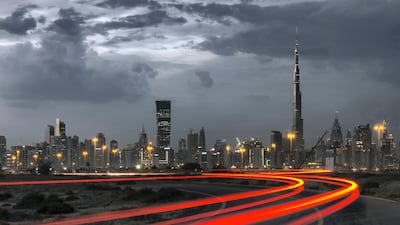The UAE’s non-oil economy had the biggest three-month gain in November, boosted by steep growth in output and new business, according to a key gauge of the sector.
Purchasing activity rose at the highest pace since the survey began in 2009, suggesting the economy is turning a corner following several difficult years amid low oil prices.
The Emirates NBD UAE Purchasing Managers’ Index (PMI) rose to 57 last month from 55.9 in October, the sharpest pace of expansion since August. A reading above 50 suggests that the non-oil economy is growing, while a reading below 50 suggests a contraction. The survey is sponsored by Emirates NBD, Dubai’s biggest bank by assets, and produced by IHS Markit, a financial information services company.
“The PMI reading for November confirms our view that the UAE’s non-oil sector will likely see strong growth in the fourth quarter of this year, as both households and business will likely boost purchases before VAT comes into effect at the start of next year,” said Khatija Haque, head of Mena Research at Emirates NBD.
“However, the continued softness in employment and lack of wage growth suggests that any boost to household consumption this quarter will likely prove temporary.”
_____
Read More:
VAT may be simpler in the GCC but litigation will be complex
_____
The survey, which polls purchasing executives in more than 400 companies, found that selling prices dropped for the third straight month in November as firms reduced prices to stoke demand. Still, the rate of discounting was not as heavy as in the previous month, the survey noted.
When it came to output growth, the rate of expansion was the fastest in 33 months, according to the survey.
The UAE’s non-oil economy, which has been subject to lower growth in recent years, is getting a boost from a pick-up in government spending ahead of Expo 2020.
Economists also say that an improvement in the global economy is aiding tourism and real estate.
The global economy is forecast to grow 3.5 per cent this year before accelerating to 3.7 per cent in 2018, the best rate since 2011, according to the OECD.
Consumer confidence, which has also been improving in the UAE, is set to get a lift from the introduction of a value added tax as people buy durable goods before the 5 per cent levy is introduced on January 1, 2018.
Meanwhile in neighbouring Saudi Arabia, the Arab world’s largest economy, the Emirates PMI rose to a 27-month high, boosted by steep output and new order expansion.
Foreign demand also rose and job creation continued. The PMI rose to 57.5 last month from 55.6 in October.
Anecdotal evidence suggested that most of the gain in the index was driven by strong domestic demand despite investor jitters in the aftermath of a broad anti-corruption campaign.
Saudi Arabia moved to quell investor fears soon after the crackdown in early November, saying it was committed to safeguarding the rights of investors in the wake of the campaign in which prominent businessmen including the billionaire Prince Alwaleed bin Talal have been detained.
“The strong November PMI reading is particularly encouraging given the heightened political uncertainty in the kingdom and indicates that it was largely ‘business as usual’ last month,” Ms Haque said.
“That output and new orders continued to increase sharply bodes well for non-oil sector growth in the fourth quarter. Higher oil prices likely contributed to the broadly positive business sentiment.”

